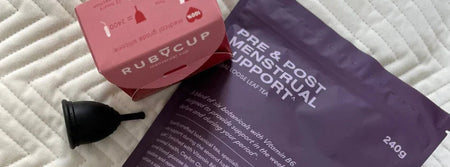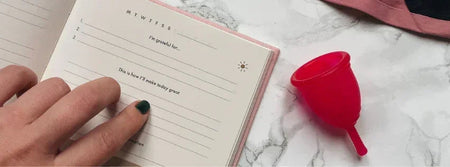Beetroot-vagina. Ketchup week. A visit from Aunt Flo. It’s strawberry season. There is a crime scene in my panty.
Do you hide your monthly period behind a euphemism; a word that indirectly expresses what you are referring to so that you can avoid saying menstruation or period directly? Many people do.
But using period euphemisms is a way of distancing oneself from one’s period. And distancing oneself from one’s own bodily functions is like distancing oneself from oneself, and that’s just plain wrong. That’s why we, at Ruby Cup, believe that menstruation is something that we should speak openly about, and this starts by calling it by its name(s). We simply stick to ‘menstruation’ and ‘period’.
In this article you’ll learn how using period euphemisms is like trying to mask or ‘dress up’ our own bodily function. Now, let’s undress menstruation.
More than 5,000 ways to call your period
There are more than 5,000 euphemisms for the word period or menstruation. And though this gives you plenty to choose from, it isn’t necessarily a good thing. A euphemism is “a mild or indirect word or expression substituted for one considered to be too harsh or blunt when referring to something unpleasant or embarrassing”, as defined by termcoord.eu. But thinking of menstruation as something unpleasant or embarrassing only defamiliarizes us from the phenomenon that is an important part of our biology.
Menstruation is a fact of life for more than half of the global population, and at this very moment an estimated 800,000 people are on their period. That’s a lot of period discharge, and this leads to a lot of personal experiences and learnings in terms of how to best deal with it.
In the Glossary for the Global Menstrual Movement by Madami and PERIOD, things are put very clear: “Language helps form the beliefs and attitudes that surround our experiences. Language affects how people who menstruate - and those who do not - feel about and understand periods.”
Knowledge sharing between people with periods and wider society requires that we can speak openly about the topic. That’s key for creating a space where everyone with periods can access the information needed to understand their own bodily functions and get inspiration to find optimal ways of handling this circumstance of life.
Covering up anything is problematic.
Examples of euphemisms for the words menstruation and periods, illustrated by Natalia Burnes:

Menstruation costumes: Time to undress the period
Earlier this year, we did a collab with a class of graphic design students of IED BARCELONA, where we discussed the link between use of menstrual euphemisms and period stigma. As our mission is to cultivate period dignity, we asked the students for visual inputs that could help us illustrate period stigma and hint towards how to break free from it. And a project conducted by Charlotte Paez was very on point.
Charlotte noted how covering menstruation behind all the existing euphemisms is like trying to mask it by putting it into costumes that makes it something that it is not. The costumes (i.e. euphemisms) that exist for menstruation tend to be very vivid - this underlines how clearly those who came up with them in the first place wanted to take distance from periods.
But: It’s time to get the costumes out of the closet - time to undress the period.
She gifted us with this beautiful graphic piece illustrating someone who has decided to open their closet once and for all to undress the period and get rid of the costumes “shark week”, “el bistec” (Mexican euphemism: “the steak”, used in the sense of “my steak has defrosted”), “vampire”, “red light”, and all the others.
Visual by Charlotte Paez:

The antidote period euphemisms
So, what’s the antidote to period euphemisms? As we’ve already touched upon, step one is to call a period by its name(s): Periods & menstruation. But there are plenty of more words we need to know in order to body ‘body literate’ and speak about our bodies in precise terms: cervix, uterus, vagina, endometrium, ovulation, menarche, menopause, and much more.
And then all the terms that help put words to injustices that exist in the world related to biology and menstruation: gender pain gap, period poverty, reproductive injustice, pink tax, and more.
If you want to be on top on all terms menstruation, visit the Glossary for the Global Menstrual Movement already mentioned earlier in this article. It’s hard for most not to learn a new term or two in this very extensive booklet, that helps spark informed conversation.
Ready to go out there and speak openly about all things menstruation? You go! We’re with you all the way.
A special thanks to Charlotte Paez for both the topic idea and the outstanding graphic design job done for this article!










